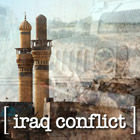
|
CIVILIAN CONTRACTORS AMBUSHED
6 January 2004 Civilian contractors were hit by an apparent guerrilla ambush in Fallujah, marking what some perceive as an elevated level of peril in the danger zone near central Iraq. Reconstruction contracts are in some cases reportedly on hold, personnel being withdrawn for fear of deteriorating security. Attacks have increased against coalition tactical infrastructure, including trucking routes and civilian facilities related to reconstruction, in an apparent effort to undermine security for the political transition. The Pentagon has also imposed a "stop-loss order", denying soldiers due for discharge the option not to re-enlist. Observers cite the order as a sign that there will not be a reduction in force during the coming year. And military sources have been cited as voicing concern about the level of morale, which will likely deteriorate among soldiers kept on active duty against their will or after an already prolonged absence from their family life. Elsewhere, protesters were fired upon while throwing rocks, aggravated over job-scarcity, slow reconstruction and recovery. Various communities have seen such demonstrations, which while appearing spontaneous vocally seek to address the problem of ongoing conflict undermining job creation and normal economic activity. [s]
UPDATES: Some 400 weapons experts and search specialists are to be leaving Iraq, though an inspection force does remain, including specialists in the disposal of chemical and biological agents. A Washington Post report noted that there was intelligence to indicate that Iraq may have destroyed its stockpiles as early as 1991. [Full Story] NO WMD, JUSTIFICATIONS FOR WAR IN QUESTION David Kay, chief weapons inspector for the Iraq Survey Group, who recently left his post, reports there was no evidence to indicate the presence of any weapons of mass destruction, any stockpiles, or any competent programs to develop such weapons. Kay said evidence was found that indicated there had been programs in the past, but that it appeared that all the weapons had been destroyed, and that the programs were in disarray, and no production facilities existed. He said his research was significantly complicated by post-war security lapses, which allowed looting of government facilities, including military and industrial sites. [Full Story] |
||||||||||
|
|||||||||||







